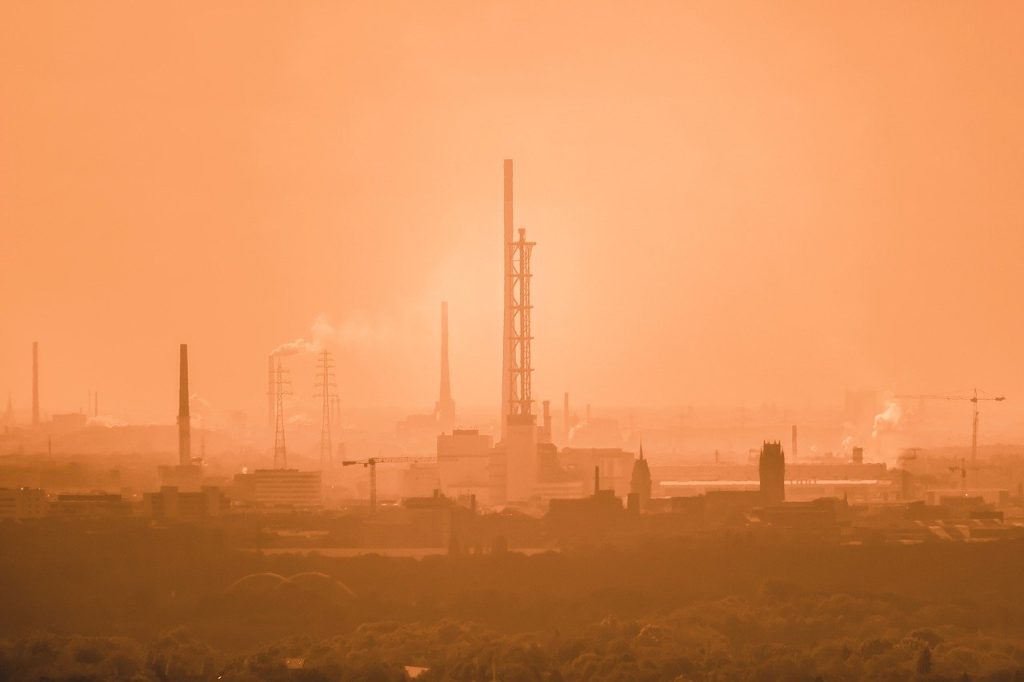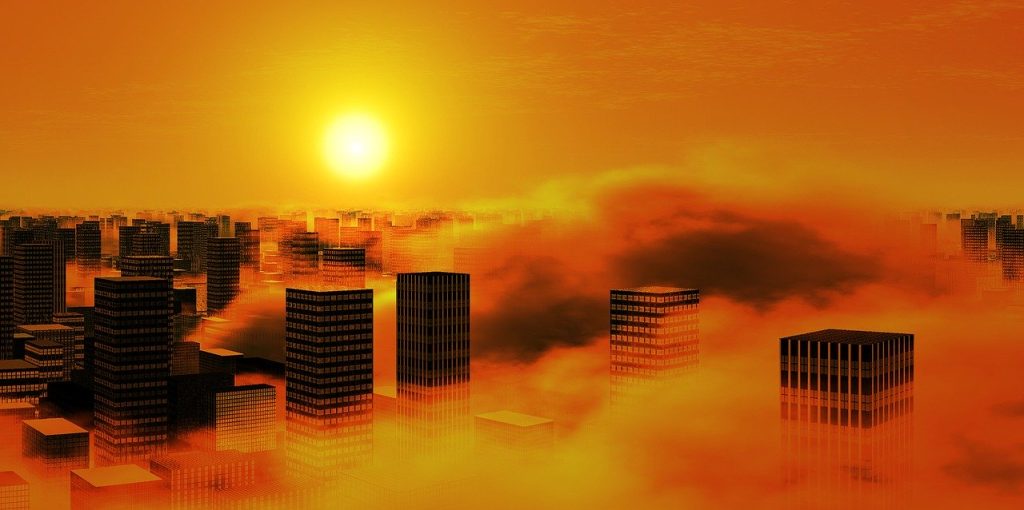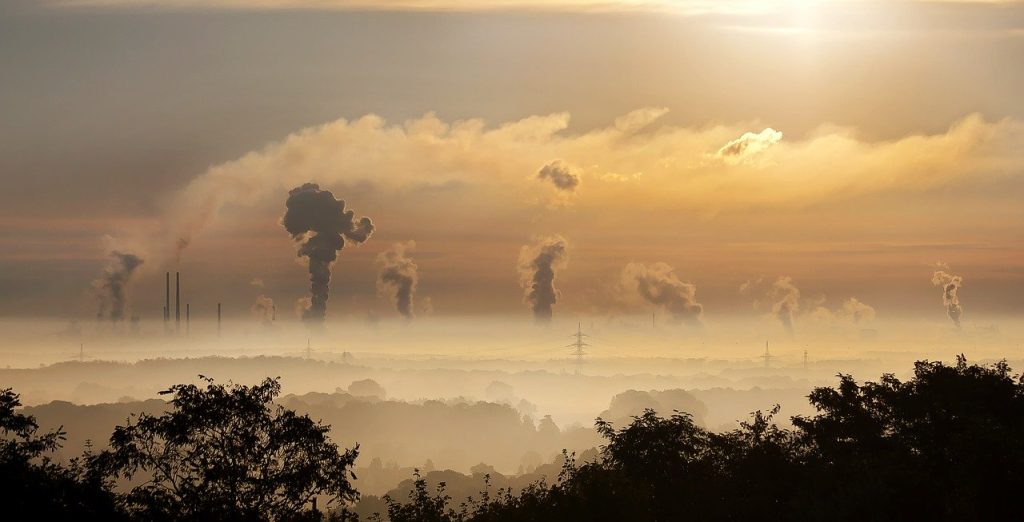The health effects of air pollution imperil human lives. This fact is well-documented.”
Eddie Bernice Johnson, Politician
54 Air Pollution Facts and Stats Everyone should know
Air pollution is a significant environmental problem that causes millions of deaths on a global scale each year.
Governments around the world try to mitigate the air pollution problem, however, it is still a long way to go.
In this article, all important facts you need to know about air pollution are shown.
List of the most important Air Pollution Stats & Facts
- Behind high blood pressure, dietary issues and smoking, air pollution is considered to be the 4th largest human health threat.
- Nine out of ten people are exposed to polluted air.
- Around seven million people die each year from the consequences of air pollution.
- Four million people die from indoor air pollution every year.
- Poor countries are more affected by deaths due to air pollution compared to rich countries. According to the WHO, 91% of premature deaths due to air contamination occurred in low- and middle-income countries.
- Air pollution can lead to a significantly lower life expectancy due to an increased chance for diseases. In countries with quite high levels of air pollution, life expectancy can be almost one decade less compared to countries with good air quality.
- India is the country with the worst average air quality worldwide.
- Seven of the ten cities with the worst level of air pollution are in India.
- India, China, Bangladesh and Pakistan account for the 50 most polluted cities worldwide when it comes to air pollution
- Seven of the ten cities with the worst level of air pollution are in India.

- India, China, Bangladesh and Pakistan account for the 50 most polluted cities worldwide when it comes to air pollution.
- Around three billion people worldwide do not have a supply of clean fuels for indoor activities like cooking, which translates into vast indoor air pollution and can cause diseases of all sorts.
- The highest death rates from air pollution occur in Western Pacific and South-East-Asia regions.
- Air pollution is considered to be one of the most harmful forms of pollution and is considered more dangerous to human health than water pollution.
- Improved regulation on emissions and more sophisticated urban planning policies could mitigate the problem of air pollution significantly.
- Our body is basically without protection against microparticles from air pollution, which can get in our respiratory system and damage our lungs. Moreover, they can also damage our heart and brain system.
- Small children and infants are more affected by air pollution than adults since their body is usually more vulnerable and the chance for lung diseases and other serious health issues is higher.
- Whenever possible, individuals should try to use clean fuels for cooking, lighting and heating in order to protect their health.
- A high concentration of particle pollution due to air contamination can be quite dangerous for our health, since these particles will enter our respiratory system and can cause lung cancer and other health problems.

- Air pollution can also contribute to climate change, since many components of air pollutants like carbon dioxide or methane are greenhouse gases which increase the speed of global warming.
- More people are killed by air pollution each year than from road injuries, HIV and Tuberculosis combined.
- The global economic cost of air pollution amounts to 225 billion USD, mainly due to a loss in workforce as a result of diseases related to air contamination. However., this estimate seems to be quite conservative. Some studies conclude that in Europe alone, air pollution results in an economic loss of around 140 billion EUR.
- The big majority of the worldwide population lives in regions where the official air pollution limits set by the WHO guidelines are exceeded dramatically.
- Clean air which is rich in oxygen contributes to a higher quality of life.
- High air quality is crucial to achieve high levels of mental performance since the supply with sufficient oxygen improves our brain capacities.
- Although air pollution has been a problem for humanity for a long time, over the past decades, the chance for lung issues due to air pollution has increased significantly since the level of air pollution increased on a global scale.
- Compared to vehicles that are run by fossil fuels, electric cars do emit lower levels of harmful substances into the atmosphere. However, since a big fraction of our energy is produced with the help of fossil fuels, electric vehicles are not as clean as told to the general public.
- Heavy crude oil is more harmful to our air quality compared to the use of light oil.
- Persons who work in jobs outside have a greater risk to suffer from respiratory diseases due to air pollution.

- Since people who live in countries that have formerly been developing countries but are now turning into developed countries aspire to higher lifestyles, air pollution drastically increases in those regions since the production of material goods implies significant air pollution.
- Air pollution is not only harmful to humans, but can also cause severe health issues for a variety of animals.
- In Europe, around 90% of ammonia emissions are due to agricultural pollution.
- About 80% of methane emissions are due to agricultural processes.
- 60% of Sulphur oxides in our air come from energy production and distribution processes.
- Around 40% of nitrogen oxides are due to road transport activities.
- Apart from man-made causes, natural causes like volcanic eruptions, wildfires and sand storms can also contribute to air pollution.
- You can reduce your air pollution on a daily basis by avoiding the use of your car and switch to public transport instead.
- If there is no good public transport in your city, you could also use carpools which would still be better compared to using your car alone.
- The most efficient way to avoid air pollution is to walk or take the bicycle since it implies zero emissions.
- You can also reduce air pollution through a reduction in consumption since the production of material goods always implies the emission of harmful gases into the atmosphere.
- You can further improve your ecological footprint by reducing your waste production, since part of our waste is burned which leads to emissions and air pollution.
- There are many false beliefs on the topic of air pollution. While people are often aware that the use of their cars is a big contributor to air pollution, many people do not consider their consumption behavior as a big problem for air pollution, although it is!
- Air pollution not only is a local problem, but can also translate into a global problem due to the global warming issue. Moreover, polluted air can be spread over quite long distances. Air pollution caused in China may even eventually decrease the overall air quality in the U.S. to a certain extent.
- In Asia, the majority of fatalities are due to the consequences of air pollution.
- Air pollution is considered to be one of the biggest ten reasons for death on a global scale.
- Even in highly developed countries like America, air pollution is still responsible for around 50,000 deaths each year.

- In some cities where air pollution is a quite big problem, people even wear masks when they leave their homes in order to protect their health.
- Although there are efforts to shift from conventional to green energy sources, it is not quite clear if the overall air quality will increase in the near future. Many people emerging nations aspire quite high lifestyles similar to the lifestyles in our Western world. This may work against the efforts for less air pollution since consumption always implies emissions of some sorts.
- If you are stuck in traffic jams, pollution inside your car can become more than ten times higher than outside due to pollutants from other cars entering your car through the ventilation system.
- Diseases related to air pollution can also prevent people to attend school. Prominent examples of this are Asthma or Bronchitis.
- Indoor air pollution is considered to be even more harmful than outdoor air pollution since pollutants will likely stay inside and cannot disperse inside.
- Living next to roads with high levels of traffic increases the chance of diseases related to air pollution.
- Living close to power plants may harm your health due to the emissions from industrial processes.
- Many countries are aware of the problem of air pollution and try to fight it using by introducing carbon dioxide certificates in order to price emissions appropriately and to reduce the overall level of emissions.
- The exposure to high levels of air pollution can cause serious long-term health effects, especially for children whose respiratory system has not been fully developed yet.
- It became obvious that some car companies tried to cheat emission tests in the past to look more environmentally-friendly than they actually are.
Sources
https://www.who.int/gho/phe/outdoor_air_pollution/burden/en/
https://www.eea.europa.eu/themes/air/air-pollution-sources-1
https://en.wikipedia.org/wiki/Air_pollution
https://climatekids.nasa.gov/air-pollution/

About the author
My name is Andreas and my mission is to educate people of all ages about our environmental problems and how everyone can make a contribution to mitigate these issues.
As I went to university and got my Master’s degree in Economics, I did plenty of research in the field of Development Economics.
After finishing university, I traveled around the world. From this time on, I wanted to make a contribution to ensure a livable future for the next generations in every part of our beautiful planet.
Wanna make a contribution to save our environment? Share it!